In the second of two blog posts on looking for work after cancer, recruitment consultant Ash Holmes answers some of the questions that were put to him via our private Facebook group. If you’re looking for work, make sure to check out his original post too. And good luck!
How should I deal with gaps in my CV? I don’t want the time I took off for treatment etc. to be seen as a red flag to an employer.
This is probably the hardest question to answer as there are so many variables, and it will depend on your individual circumstances and how open you wish to be.
If you’re returning from a career break, no matter how long or short, it is best to at least address it in some way on your CV. Don’t leave it up to the individual reading your CV to wonder and draw their own conclusions.
Depending on how open you plan to be, simply putting ‘career break due to personal reasons, happy to discuss during a call/interview’ could be enough to stop a potential employer from wondering and instead focus on the rest of your CV and application.
Wording here is very important! As a reader, the difference between ‘personal issues’ and ‘personal reasons’ is huge. Try to think carefully about any language you use and avoid sounding negative. Ask for a second opinion, and get someone else to read through your CV.
If you do not want to talk about your reasons for having a break, then simply putting ‘career break’ with the relevant dates is still better than leaving a gap. By being transparent and addressing any empty spaces head-on, it stops any reader from trying to guess what’s happened. This is your chance to ‘control’ the reader’s impression.
Most recruiters and hiring managers will make a quick judgement about a CV, and finding an extended gap between dates is often one of the first things that they will want to ask about. Bearing that in mind, it’s important for you to be able to provide a reason for the career break, even if you are not going to talk about cancer. People take career breaks for a number of reasons, including: concentrating on family/a hobby or passion, feeling they have achieved everything they wanted and needing time to consider the next step, the end of a contract, or a change in circumstances (professional or personal) that meant they did not want to rush into a new position.
Where can I find good examples of CVs for different types of jobs?
For all CVs, there are core principles to be followed:
- Make it clear and easy to read (do not try and fill every bit of white space with boxes of text)
- Be concise (the ‘two pages’ rule is a good guideline, but it’s only a guideline!)
- Make sure the content is relevant to the position you are applying for (you might need to create a few different versions of your CV)
- Make sure key information is clear and well positioned (name and contact details at the top)
- Don’t be afraid to use bold, underline, italics, or bullet points to emphasise information
- Triple-check for grammar and spelling – and ask a friend to check it
- If you are speaking to a recruitment consultant, ask for their advice
It’s useful also to consider the standards in your industry. A web designer might create their own website with examples of their previous work, for example, or a graphic designer might have a portfolio.
If you have recommendations on LinkedIn, you might want to include a link to your profile in your CV. If you are wondering how to ask for recommendations on LinkedIn, one of the most effective ways is to complete a recommendation for someone else. Once accepted, they might complete one without asking. Alternatively, explain that you are returning to work and that you would really appreciate a recommendation.
Professional CV writers do exist, but I would be very wary about paying anyone money. You will likely receive similar advice to that which you can already find online. The majority of job boards also have blog posts and CV templates readily available.
You can find a sample of my CV at the end of this blog.
Should I mention my cancer in an interview? What’s the best approach to mentioning time off without scaring employers?
First of all, it’s important to note that you are not obliged to disclose a cancer diagnosis and it is actually illegal for an employer to ask about your health in an interview. Once you’ve been diagnosed with cancer, you’re covered by the Equalities Act 2010 which provides legal protection against discrimination relating to employment, including during the recruitment process.
Having said that, whether you want to mention your cancer diagnosis is your choice. Personally, I think you need to focus on why you are the right person for the job, what you can bring, and how it will be beneficial for the employer/hiring manager. If you are going to discuss your illness, it is probably better to bring it up in person, during a later stage interview. Here, you can gauge a potential employers’ reaction and reassure them of your capability to do the role – and by this point, you already have your foot in the door. You can also control the conversation by providing relevant information and answering any questions.
When your cancer experience is relevant to your job and could be beneficial (in that it provides a useful perspective), how should you bring it up? I don’t want to present a sob story!
 If you feel something is relevant and it will help you to be better at your job… mention it! Sell your strengths/experiences. Here is where a cover letter on an initial application might be the right approach. Just saying ‘I’ve had cancer’ isn’t enough: you need to explain why and how that will make you better at the job.
If you feel something is relevant and it will help you to be better at your job… mention it! Sell your strengths/experiences. Here is where a cover letter on an initial application might be the right approach. Just saying ‘I’ve had cancer’ isn’t enough: you need to explain why and how that will make you better at the job.
If you think your cancer experience could provide you with a ‘competitive advantage’ over other candidates, then maximise it! Don’t discount your experience and what you’ve learned through it.
Should I Google myself when I’m looking for work? Will an employer do this? What kind of stuff do they look for?
Some employers will carry out a Google search and social media check, and some won’t. It will often depend on the type of role and industry. Is the role public-facing, for example? Does it involve work with young or vulnerable people? It is always best to be on the safe side and use common sense. Here is where a professional profile, such as LinkedIn, can help you to present the best impression.
For some roles, employers will carry out police background checks, but they must ask your permission before doing this.
If you are concerned about your online image, there are often ways to make your social media profiles private. Do a quick Google search to find out how to do this for each specific platform. Many teachers, for example, change their name on social media to make it harder for pupils or parents to find them.
What’s the best way to look for a new job? Should I go online? What can a recruiter offer me?
The best approach is to combine online and offline activity. Reach out to former colleagues, friends, and acquaintances – anyone in your network who may be able to help. Hiring managers are more willing to talk on the phone or offer an interview after a personal recommendation, and if you talk to people you know then you may also hear about jobs before they have been advertised online. The process can feel less formal and more relaxed, helping you to demonstrate your skills and ability.
A huge part of the recruitment process is online, with a drive to make the process automated in many industries. Job boards are the best place to start. There are several main boards that cover a number of industries and experience levels (Indeed, CV Library, Total Jobs, Jobsite, Reed, and Monster). Alongside these are more specialised job boards. Do a Google (other search engines are available) search to find yours.
A large proportion of recruitment agencies and employers are now posting their roles on LinkedIn, so make sure you set up an account and take look.
Remember that applying via a job board or careers website is just the first stage. To stand out, it is important to follow-up via a call or email. Don’t be afraid to use social media to your advantage: if you know the hiring manager’s or recruiter’s name, add them on LinkedIn. Or ask the company for an update via Twitter!
Unfortunately, now that we have automation and most recruitment processes are online, receiving a generic rejection email is common. From May 2018, the General Data Protection Regulation (GDPR) comes into force. This means that you can request any application to be reviewed by a human instead of through automation.
Contacting a recruiter can be a great way to learn more about market conditions, industry-specific job boards, suitable roles, realistic earning potential, and which employers are more flexible with employees than others. The key to building a relationship with a recruiter is to do your research and make sure that they are working in the relevant industry to you.
A word of caution though: recruiters are sales people. Some will be very helpful and answer your questions, but others won’t – especially if they do not feel that they will be able to place you into a role.
Feel free to contact me on LinkedIn to see if I can recommend a recruiter based on your career goals/background.
Ash Holmes has spent the last seven years working in the recruitment industry. As well as working with thousands of candidates, Ash has created and delivered employability training to college students and individuals who are not in work, education or employment. Ash has placed candidates with organisations as varied as Red Bull, Olympus KeyMed, Tottenham Hotspur, and Red Gate Software. He is more than happy to answer any follow-up questions and connect on LinkedIn.
Here’s a sample CV – Ashley Holmes
Borough, London, SE1
E: example@e.com. M: +44 (0) 00000 0000000
L: http://linkedin.com/in/ashholmes14
An experienced operations and marketing professional with over 7 years’ experience within the recruitment industry. Looking for a role and organisation to be able to continue my development, expand my experience and match my ambition. I have recently returned from spending a month in North America and am now looking for a new role.
I bring a wide range of experience and skills to the role including:
- Strategy
- Communication
- Change management
- Systems and process
- Project management
- Marketing & social media, including ress
- Internal recruitment
- Third-party management (suppliers, etc.)
- Sales & account management
- Training
As part of my personal development I completed a Level 6 Diploma in Professional Marketing from the Chartered Institute of Marketing in January 2017. The Diploma has helped me to understand the role that marketing plays within business, study key business-focused modules including Change Management, and to view marketing from a much more strategic position.
Employment History
Etonwood Ltd. (UK)
September 2017 – November 2017
Operations Director
Brought in to put in place the systems, process, and policies to help the organisation double in size. Implemented:
- Trainee & senior attraction & interview process
- On-boarding process & creation of ‘Welcome to Etonwood’ book
- Mapped career progression & formalised job descriptions
- Put in place appraisal process based on the above
- First stages of GDPR policy
- Created brand guidelines
- Created social media strategy & reached over 100,000 LinkedIn impressions from 0
- Put in place all health and safety policies
Raw Talent Academy Ltd. (UK)
May 2011 – August 2017
Operations, Marketing & Recruitment Manager
Joined as first full-time employee. The role evolved as the organisation grew to include marketing, operations, and finally managing the recruitment team.
Key Responsibilities:
- Member of the Senior Management Team providing input on company-wide strategy
- Creation & implementation of Marketing strategy to drive B2B lead generation & candidate attraction in line with company objectives
- Marketing & Operations budget
- Management of team of three recruitment consultants & one administrator – increased delivery from 73% (H1 2016) to 123% (H2 2016)
- Account-managed two key accounts
- Project-managed rebrand and launch of new website (launched 2017)
- Project-managed development of a Digital Recruitment Assessment tool (SiD Digital)
- Management of IT & processes, including: CRM/ATS, Office365, Data Recovery, IT support
- Managed key external/supplier relationships (CRM, developers, graphic design, video creation, job boards)
- Contracts, terms and policies (employee contracts, Health & Safety, etc.)
- Press releases & award entries – existing relationships with recruitment industry journalists and publications, as well as some national publications.
Key Skills:
- Microsoft Office
- Adobe Photoshop, InDesign
- iMovie
- Basic HTML
MarketMaker4 (UK)
Technology Company
March 2011 – May 2011
Consultant
Travelling in Australia
January 2010 – February 2011
RightNow Technologies Inc. (Australia)
International Information Technology Company
April – December 2009
Assistant to Marketing Manager APAC / Business Development Representative APAC
Key Responsibilities:
- The building and purging of customer and prospect databases to ensure the correct contact is listed along with correct contact details
- Arranging and organising events for, and in partnership with, the Marketing Manager to ensure customers and prospects have a positive customer experience at the events
- Helped in the development of and provided feedback regarding Marketing campaigns so that they have the maximum impact and highest response rates
- Engaging with customers and prospects in the run-up to company events to encourage attendance
- Identifying and contacting prospect and target accounts to create business opportunities
Foodnet Ltd. (UK)
International Food Trading and Production Company
June 2008 – March 2009
Purchasing and Sales Admin
Education
The Chartered Institute of Marketing (UK)
November 2015 – January 2017
Level 6 Diploma in Professional Marketing
Modules; Strategic Marketing, Marketing Metrics, Driving Innovation
Chesham High School (UK)
September 2006 – April 2008
3 A-Levels A-D
Amersham School (UK)
September 2001 – June 2006
9 GCSE’s A-C
Interests
Sport and music are my two main passions. I am a keen runner and have completed three marathons to date (London, Paris and Nice to Cannes). I also regularly attend live music.
References available on request.

As a cancer patient, the information about how to apply for work is very useful. I find that age seems to be an issue as well.